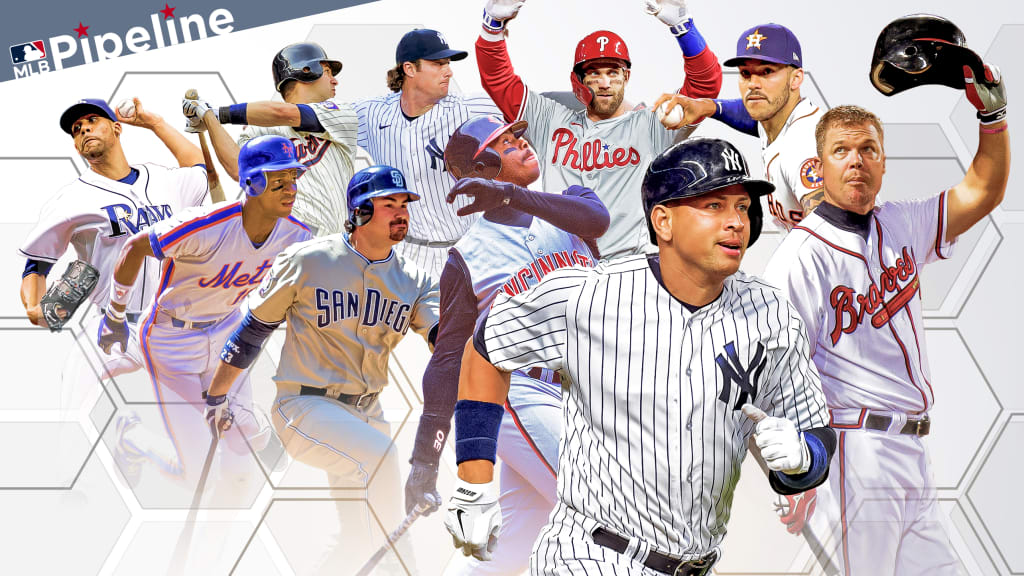
The Draft has evolved significantly since its inception in 1965, and so has the efficiency in which teams have selected players.
Look at the No. 1 overall picks, for instance. The Athletics scored with the first-ever choice in the first-ever Draft, taking Arizona State outfielder Rick Monday and landing a player who would play 1,986 games during 19 seasons in the big leagues, hitting 241 home runs and making two All-Star Game appearances. But among the top selections in the next 10 Drafts, only Jeff Burroughs (1969, Senators) became more than a journeyman, let alone an All-Star.
With Orioles infielder Jackson Holliday (2022) on the verge of becoming the next No. 1 overall pick to make his big league debut, we thought it would be instructive to rank the best No. 1s of all-time. While projecting high school and college players into the future is still far from a sure thing, clubs have gotten better at doing so. Nine of our choices for the Top 10 below come from the single-Draft era, which began in 1987.
When Holliday plays his first game with Baltimore, 55 of the first 58 No. 1 selections will have reached the Majors, with Steve Chilcott (1966, Mets), Brien Taylor (1991, Yankees) and Brady Aiken (2014, Astros) the only exceptions. Kris Benson (1996, Pirates) represents the median in production among those picks, posting a 70-75 record with a 4.42 ERA in 206 games.
Interestingly, the best three No. 1 choices ever were not clear-cut decisions for their clubs. Our list doesn't include Hall of Famer Harold Baines (1977 White Sox), who obviously had a solid career but is perhaps the most surprising Cooperstown inductee in recent memory.
1. Alex Rodriguez, SS, Mariners (1993)
Mariners manager Lou Piniella wanted some immediate help for his pitching staff in Wichita State right-hander Darren Dreifort, but scouting director Roger Jongewaard held firm on taking the player who still sets the standard as the best prospect of the single-Draft era. A Florida high school product, Rodriguez turned his five-tool potential into reality with three American League MVP awards, 14 All-Star Game berths, 10 Silver Sluggers and two Gold Gloves -- and he reached the big leagues at age 18 one year after signing. His use of performance-enhancing drugs may keep him out of the Hall of Fame, but he batted .295/.380/.550 over 22 seasons and ranks fifth all-time with 696 homers and 2,086 RBIs.
2. Chipper Jones, SS, Braves (1990)
Texas high school right-hander Todd Van Poppel was one of the most hyped prospects in Draft history at that point, and the Braves reportedly offered him a seven-figure big league contract. But Van Poppel wouldn't meet with the team because he was set on attending college at Texas, so Atlanta opted for Plan B in Jones, a Florida prepster who signed for $275,000 before becoming a Hall of Famer and one of the best switch-hitters in baseball history. An eight-time All-Star and the 1999 National League MVP, he easily eclipsed Van Poppel, who signed with the A's for $1.2 million as the 14th overall choice.
3. Ken Griffey Jr., OF, Mariners (1987)
Six years before A-Rod, Jongewaard also had to deal with pressure to take a college pitcher, in this case, owner George Argyros agitating for Cal State Fullerton right-hander Mike Harkey. Once again, Jongewaard correctly pushed for a high school position player with more upside in Griffey, a Hall of Famer who became the face of the franchise and helped keep it in Seattle. He made the 1989 Opening Day roster at age 19 and earned All-Star and Gold Glove recognition in each of his next 10 seasons, as well as AL MVP honors in 1997, the first of back-to-back 56-homer years. The second half of his career wasn't as spectacular as the first, but the 13-time All-Star nevertheless ranks seventh all-time with 630 homers.
4. Bryce Harper, OF, Nationals (2010)
Perhaps the most acclaimed Draft prospect of all-time, Harper graced the cover of Sports Illustrated as a high school sophomore in 2009 and then got his GED degree so he could attend the JC of Southern Nevada and enter the 2010 Draft. After he led national junior college players with 31 homers -- as a 17-year-old would-be high school junior in a wood-bat league! -- the Nationals went all in on his bat and moved him from catcher to outfielder. He was an All-Star and NL Rookie of the Year at age 19 in 2012, won the 2015 and 2021 NL MVPs and has earned seven All-Star berths while swatting 309 homers through his age-30 season.
5. Joe Mauer, C, Twins (2001)
Southern California right-hander Mark Prior and Georgia Tech third baseman Mark Teixeira were the most famous players in the 2001 Draft and both wound up landing unprecedented eight-figure big league contracts. But the Twins bypassed them for local prep product Mauer, an uncommonly gifted catcher who was also a blue-chip quarterback recruit ticketed for Florida State. He surpassed both Prior and Teixeira as a Hall of Famer and six-time All-Star who won the 2009 AL MVP award, three batting titles and as many Gold Gloves.
6. Gerrit Cole, RHP, Pirates (2011)
The 2011 Draft was stacked with more talent than any in the past 15 years and the top choice was Cole, who set a since-broken bonus record of $8 million after going two picks ahead of fellow UCLA right-hander Trevor Bauer, who outperformed him in college. Cole helped the Pirates make the playoffs in his first three big league seasons from 2013-15, earning All-Star acclaim in the last of those years, but he leveled off as the club regressed afterward. He has taken his game to new heights following a trade to the Astros in 2018 and joining the Yankees as a free agent two seasons later. He has pitched in five All-Star Games, led the AL in ERA and strikeouts twice each, finished in the top five of Cy Young balloting five times and won the award in 2023. If his current elbow injury is no more than a short-term issue, he'll have no rival as the best No. 1 pitcher ever and could rise as high as fourth on this list.
7. Carlos Correa, SS, Astros (2012)
In the first year of bonus-pool rules that limited spending, the Astros made a run at Stanford right-hander Appel but couldn't nail down financial parameters and shifted their focus to Correa, a Puerto Rican prepster who dazzled a number of clubs in pre-Draft workouts. He arrived in Houston at age 20 and won an AL Rookie of the Year award, a World Series ring and a Gold Glove while making two All-Star teams and hitting 133 homers in seven seasons there. He appeared to be on a Hall of Fame trajectory before following a strong first season with the Twins with the worst performance of his career in 2023.
8. Darryl Strawberry, OF, Mets (1980)
The Mets were in the midst of a seven-year stretch in which they'd never finish higher than fifth in the six-team NL East, but the turnaround that culminated in the 1986 World Series championship began with the selection of Strawberry, a high school basketball and baseball star from Los Angeles. While injuries and drug problems kept him from winding up in Cooperstown, he still was the 1983 NL Rookie of the Year, made the All-Star Game in the following eight seasons and finished with 335 homers and three World Series rings. By the way, the area scout who signed Strawberry was none other than Jongewaard, directly tying him to three of the best eight No. 1 picks of all time.
9. Adrian Gonzalez, 1B, Marlins (2000)
In a Draft with one of the weakest first rounds ever and teams making a concerted effort to stem the tide of rising bonuses, there was no consensus No. 1 overall talent. Perhaps the closest was California high school right-hander Matt Harrington, who dropped to the Rockies at No. 7 amid signability concerns, couldn't reach an agreement with Colorado and never pitched in organized ball. The Marlins did a nice job of identifying another California prepster in Gonzalez, who helped his cause to go first by agreeing to a $3 million bonus four days beforehand. Miami included him in a trade with the Rangers for Ugueth Urbina en route to winning the World Series three years later and Gonzalez didn't find success until getting dealt to the Padres in 2006. After that, he totaled five All-Star Game appearances with three different clubs, accumulating four Gold Gloves and two Silver Sluggers.
10. David Price, LHP, Rays (2007)
Vanderbilt ace Price was the strong favorite to go No. 1 overall entering 2007 and never relinquished that status, then contributed to an improbable Rays World Series run at the end of his first full pro season. A five-time All-Star with two different teams (Rays, Tigers) and a World Series champion with a third (Red Sox), he won the AL Cy Young Award in 2012 while finishing runner-up in 2010 and 2015. His 157 victories trail only Mike Moore (1981 Mariners, 161) among top choices.
